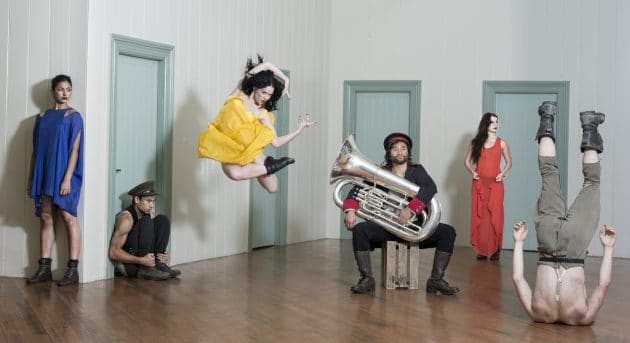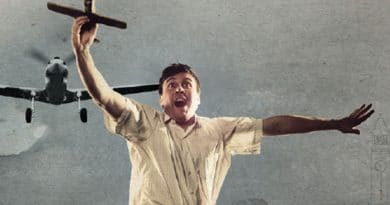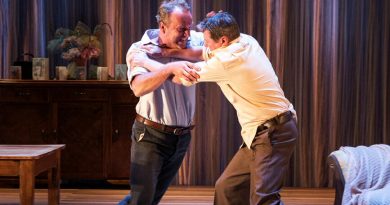Rotunda: Brass band, dance remembers ANZAC pain
“I want to make work that anybody can understand and connect with,” says Shona McCullagh, chief executive and artistic director of the New Zealand Dance Company (NZDC).
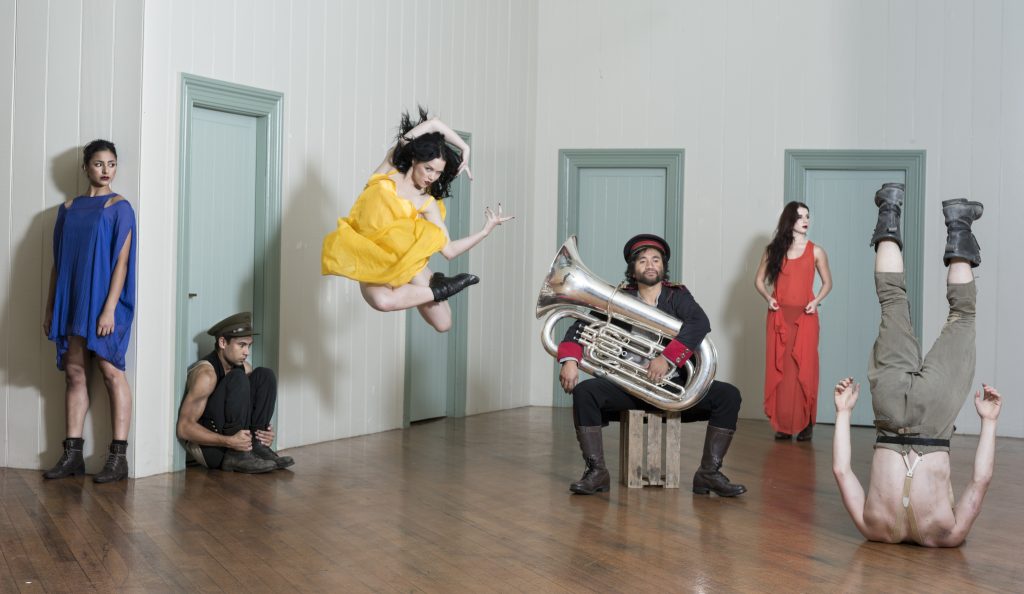
Case in point: Rotunda, the company’s first full-length production, a fresh and different kind of commemoration of the ANZAC centenary.
It makes an unmistakably emotional impact—even on the most reticent of audiences. At the show’s opening in Auckland, McCullagh says, “there were a huge number of men who came up to me and said, ‘I was dragged along to this and I didn’t really want to come, and I just want to tell you how utterly moved I was and how much I laughed and I cried.’”
So what makes Rotunda so engaging?
For a start, it tells a story—and not all contemporary dance aims to do that. What’s more, this story is about very relatable characters: four young men, ordinary blokes, larrikins, who go off to fight in World War I. Third, the story is told with humor and compassion.
“They’re just normal guys who go through a terrible human experience,” says McCullagh. “We set that up quite carefully. There’s a very important scene where they steal the brass band’s mace and they play with it. It’s very humorous and delightful and we fall in love with these gorgeous young men.”
But, she says, “suddenly they’re not playing at war. They’re really at war, and it’s terrifying and life-changing.”
Underlying all this is the music, performed on-stage by a brass band. That music inspired McCullagh when she discovered “the most stunning contemporary brass music, which shocked me because I was extremely ignorant about the form. And then I was just astonished to find this beautiful, surprisingly emotional music that was written by some fine contemporary New Zealand composers.”
Much of this music had been commissioned for brass-band competitions and, McCullagh says, “a lot of it is fiendishly difficult, and hasn’t been heard outside of those competition circles.” Then she discovered the long history of brass bands in New Zealand: “Within 20 years of European settlement, 60 brass bands had sprung up all over the country.”
But as well as its historical significance, this music is accessible and powerful. “It is just the most powerfully emotive, resonant music. I use the word visceral. It speaks to us so clearly,” she says. “The bands play to create nationalism, a sense of order, to celebrate, to herald, to welcome, to farewell, to grieve, to bury and, most importantly at this time, to commemorate.”
“None of us could imagine an ANZAC Day service without the brass band,” she continues, “so I wanted to create a work that was a living memorial for those who lost their lives or who survived by suffered, and also celebrate the role of brass bands in society then and now.”
On the Australian tour, the music is performed on-stage by 24 volunteer members of the City of Holroyd Brass Band, whom McCullagh describes as “salt of the earth”. She has choreographed movement for them, so they are right in the middle of the unfolding story, not simply off to the side providing musical accompaniment.
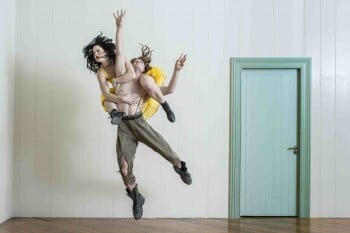
As to dancers of the NZDC, McCullagh says that “this particular group is intensely eclectic. They come from all walks of life and have very varied backgrounds. Some of them didn’t start professional dance training until their 20s. With that, you get this incredibly rich tapestry of identity. We certainly work in a process that’s very collaborative and so the whole collaborative team feels a huge amount of ownership of what emerges on the stage.”
McCullagh, along with Frances Turner, founded the New Zealand Dance Company in 2011, “to create a permanent, high caliber, national contemporary dance company.” Pointing out that there had been no such company in New Zealand for 25 years, she said that the company was the result of an epiphany she had while walking on the beach. “I thought, ‘I enjoyed an amazingly rich career in dance and I think I’ve got the skills to create a structure and create jobs.’”
McCullagh’s long career has been amazingly rich, spanning dance, theatre, television and film—both her own short dance films, and contributions to other people’s productions. For instance, for a scene in the Peter Jackson film King Kong, she worked with 600 Somalian refugee performers. She was also Head Choreographer for the large-scale spectacle of the opening ceremony for the 2011 Rugby World Cup. In other words, she understands popular culture and the potential for emotional impact through the movement of the human body.
Rotunda mixes the dancers and musicians with mace twirling, shadow play, and Maori tradition. Cast member Chrissy Kokiri performs an “utterly heartbreaking” Maori song that, says McCullagh, “was written to farewell a son leaving the shores to go to war. You really feel the female energy, the heartache, the sorrow, the sadness of this separation for these thousands of mothers.”
“Rotunda” refers to the many memorial band rotundas throughout New Zealand, modest architectural relics of a past time. McCullagh describes them as “soulful” and remembers seeing them on childhood trips with her family, wondering “What used to happen there?” In this work, they become symbols of community, the significance of which changes with the impact of the war. “At the beginning of the work, we touch on the simplicity of social interaction,” she says. “Before the war broke out, the rotunda was the place where people came to listen to music, to dance.” Many commentators note the massive social changes after the War; the memorial rotundas commemorate a past way of life as well as lost lives.
This is the first Australian tour for the New Zealand Dance Company with its “unmistakably New Zealand choreography”, as the media release puts it. Australians are not particularly familiar with dance from our near neighbour, but McCullagh is optimistic this will change. “I really hope this is the beginning of a new era of more dynamic trans-Tasman cultural exchange,” she says. “The collaboration with Australia is something that we’re really excited about.”
• Riverside Theatres, Parramatta, Wednesday, May 13-Saturday, May 16:
Book tickets through the Box Office (02 8839 3399) or on-line at www.riversideparramatta.com.au.
• Playhouse Theatre, Geelong Performing Arts Centre, Thursday, May 21-Saturday, May 23:
Book tickets on-line at gpac.org.au

